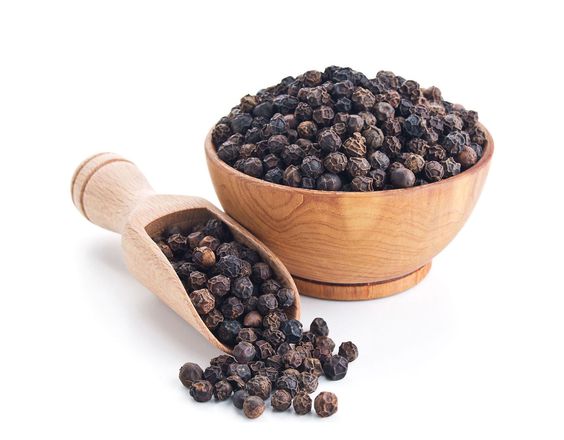Herbs and Spices - Black Pepper

Black Pepper
The humble spice holds more benefits than you can imagine. It belongs to the Piperaceae family, and is processed in different method to yield different kinds of peppers. Says, the cooked and dried unripe fruit is black pepper, the green pepper is from the dried and unripe fruit, and white pepper are the seeds from the ripened fruit of the plant.
While pepper originally belongs to South India, it's grown in other tropical countries as well. It played an important role in history, and has been considered as an important spice from time immemorial. In ancient Greece, pepper has held such high prestige that it was not only used as a seasoning but as a currency and a sacred offering. In later years, it became pivotal in the spice trade across the world.
The reason that pepper was so cherished is that it served vital culinary purposes. Not only could its pungency spice up otherwise bland foods, but it could disguise a food's lack of freshness, the latter being an especially important quality in the times before efficient means of preservation.
Incidentally, Vietnam is considered to be the largest grower and exporter of pepper. India, Brazil, and Indonesia follow suit. Pepper became an important spice that catalyzed much of the spice trade. This is not only led to exploration of many undiscovered lands, but also to the development of major merchant cities in Europe and the Middle East.
Benefits:
1.To prevent cancer: The piperine in black pepper can be credited with the prevention of cancer, and becomes twice as potent when combined with turmeric. The spice also has Vitamin C, Vitamin A, flavonoids, carotenes and other anti-oxidants that help remove harmful free radicals and protect the body from cancers and diseases.
2.Stimulates digestion: Piperine in black pepper eases digestion and stimulates the stomach, which then secretes more hydrochloric acid that helps to digest proteins in food. So a bit of pepper in food will actually help you to digest it faster.
3.Relieves cold and cough: It does helps to cure cold and cough due to its antibacterial properties in nature. A teaspoon of honey with freshly crushed pepper does the trick. It also assist in reliving chest congestion, often caused by pollution, flu, or a viral infection. You can add it to hot water and eucalyptus oil and take steam. Furthermore, the high content of Vitamin C, makes it works good as an antibiotic.
4.Enables weight loss: The outermost layer of black pepper contains phytonutrients, which helps to break down fat cells, and also enhances metabolism. If you eat fresh pepper, and begin to perspire, that's the pepper helping your body to get rid of excess water and toxins. But you need to control consumption - a pinch with your food (one meal) is enough
5.Improves skin: It provides the skin with more oxygen by enabling blood circulation. Adding it to your food also takes care of unwanted skin wrinkles. Black pepper is known to help in the cure of Vitiligo, a condition where the skin loses pigmentation, and creates white patches.
6.Addresses depression: It's said that the piperine in black pepper helps to deal with depression by stimulating the brain and helps it to function properly by making it more active.
Serving way:
• Add to salad dressings with salt, olive oil and cider vinegar.
• Add to omelettes, egg mayonnaise and other cheese and egg dishes.
• Black pepper can be added to strawberries or pineapple.
• It can be added to soups, stocks, sauces, marinades and stews.
• Use to flavour homemade hamburgers, rissoles and sausages.
• Use to rub onto meats, poultry and fish before roasting or cooking.
• Use to make pepper sauce.
• Add to biscuit mixtures for spicy sweet biscuits.
• Season seafood with black pepper.
• Add to mashed potato.
• Use to flavour dips, salsas and cold sauces.
https://www.helpwithcooking.com/spice-guide/black-pepper.html
https://food.ndtv.com/opinions/black-pepper-benefits-more-than-just-a-spice-1238993